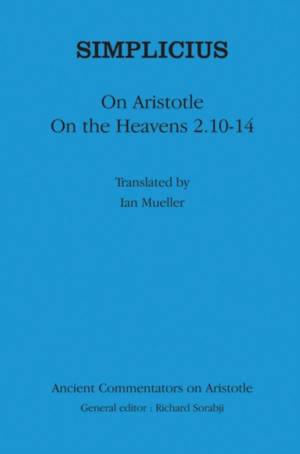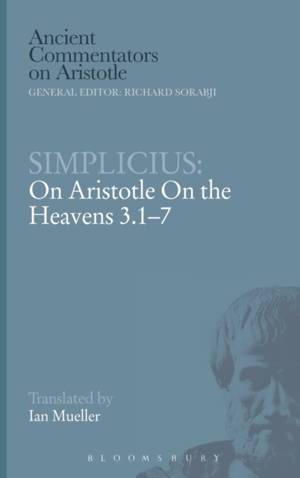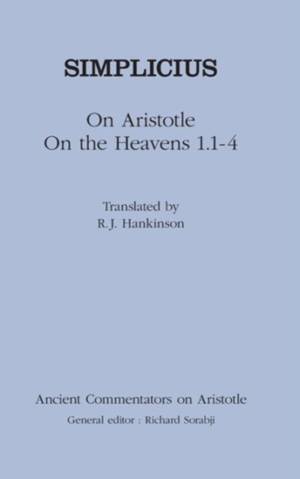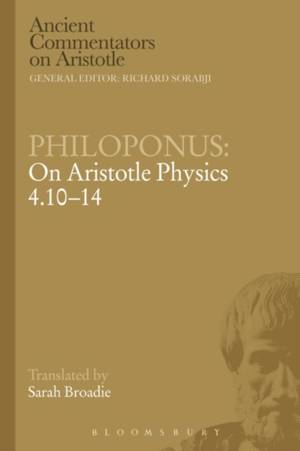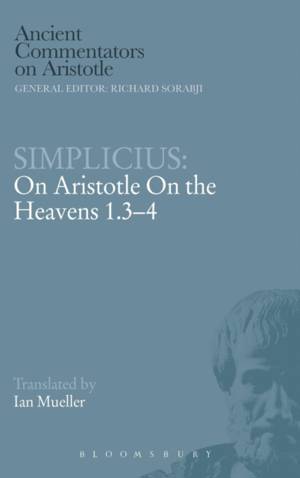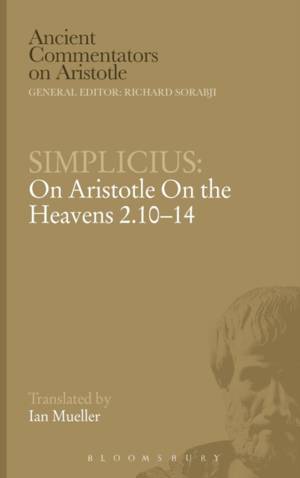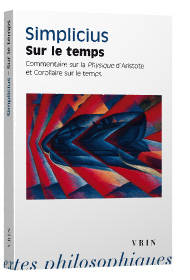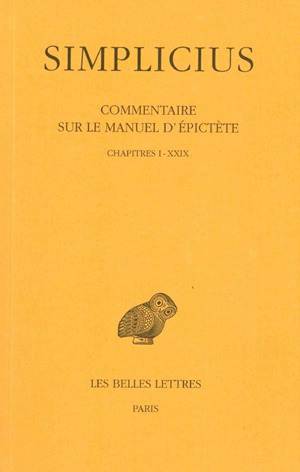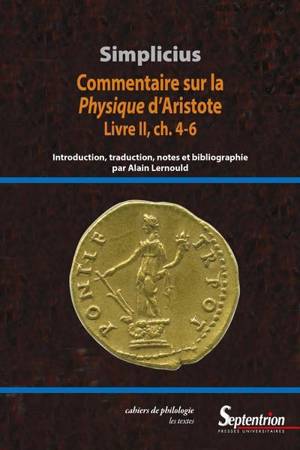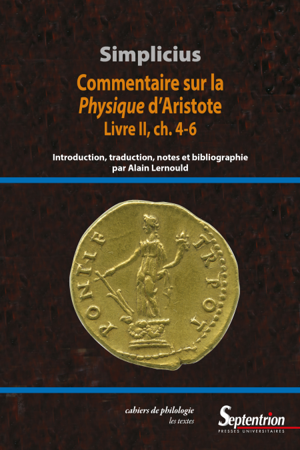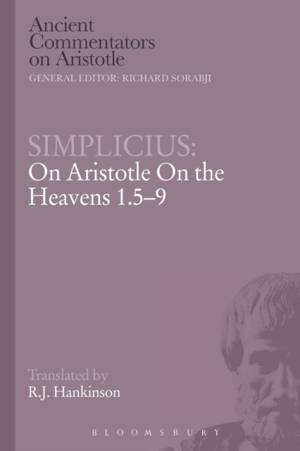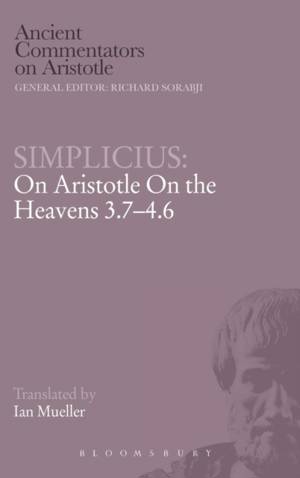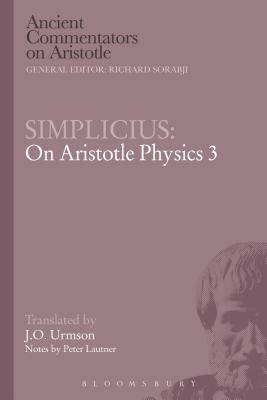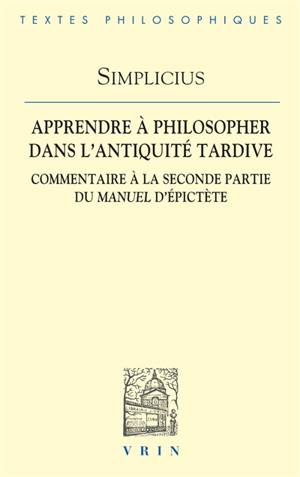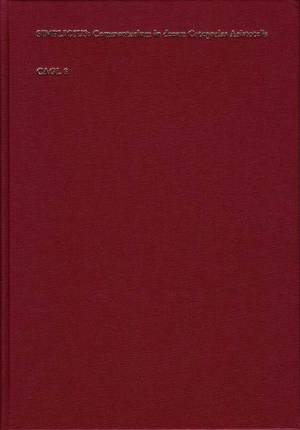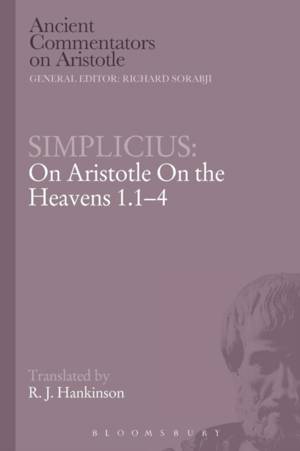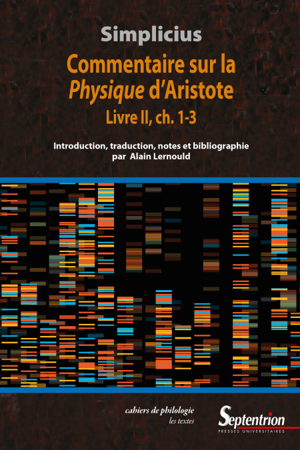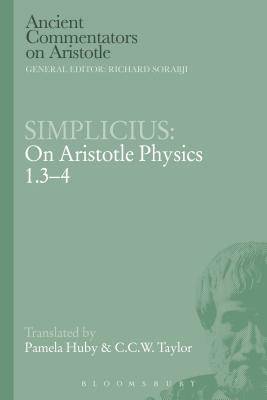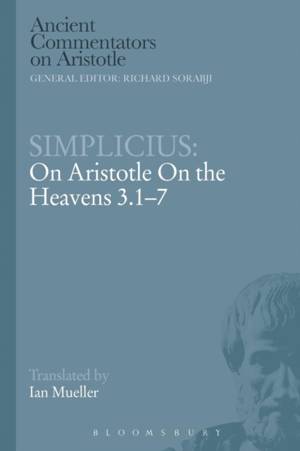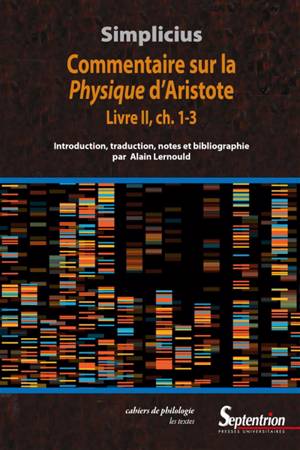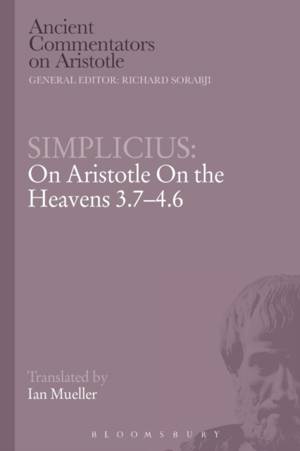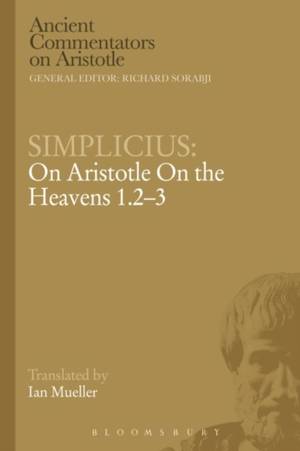
- Afhalen na 1 uur in een winkel met voorraad
- Gratis thuislevering in België vanaf € 30
- Ruim aanbod met 7 miljoen producten
- Afhalen na 1 uur in een winkel met voorraad
- Gratis thuislevering in België vanaf € 30
- Ruim aanbod met 7 miljoen producten
Zoeken
Boeken geschreven door Simplicius
-
Simplicius: On Aristotle on the Heavens 2.10-14
Simplicius
- Paperback | Engels | Ancient Commentators on Aristotle
- Aristotle believed that the outermost stars are carried round us on a transparent sphere. There are directions in the universe and a preferred directi... Lees meer
€ 88,45Levering 2 à 3 weken€ 88,45Levering 2 à 3 weken -
Simplicius: On Aristotle on the Heavens 3.1-7
Simplicius
- Hardcover | Engels | Ancient Commentators on Aristotle
- The subject of Aristotle's On the Heavens , Books 3-4, is the four elements of earth, air, fire and water, which exist below the heavens. Book 3, in c... Lees meer
€ 209,95Levering 1 à 2 weken€ 209,95Levering 1 à 2 weken -
Simplicius
Simplicius
- Hardcover | Engels | Ancient Commentators on Aristotle
- In chapter 1 of On the Heavens Aristotle defines body, and then notoriously ruptures dynamics by introducing a fifth element, beyond Plato's four, to ... Lees meer
€ 139,95Levertermijn 1 à 4 weken€ 139,95Levertermijn 1 à 4 weken -
Simplicius: On Aristotle on the Heavens 1.3-4
Simplicius
- Paperback | Engels | Ancient Commentators on Aristotle
- This is the first English translation of Simplicius' responses to Philoponus' Against Aristotle on the Eternity of the World. The commentary is publis... Lees meer
€ 88,45Levering 2 à 3 weken€ 88,45Levering 2 à 3 weken -
Simplicius
Simplicius
- Hardcover | Engels | Ancient Commentators on Aristotle
- This is the first English translation of Simplicius' responses to Philoponus' Against Aristotle on the Eternity of the World. The commentary is publis... Lees meer
€ 373,45Levering 2 à 3 weken€ 373,45Levering 2 à 3 weken -
On Aristotle on the Heavens 2.10-14
Simplicius, Ian Mueller
- Hardcover | Engels | Ancient Commentators on Aristotle
- Aristotle believed that the outermost stars are carried round us on a transparent sphere. There are directions in the universe and a preferred directi... Lees meer
€ 162,45Levering 1 à 2 weken€ 162,45Levering 1 à 2 weken -
Sur le temps
Simplicius
- Paperback | Frans
- Sur le temps Comment comprendre la thèse d'Aristote que le temps est un nombre ? Est-il une durée ou un ordre de succession, un simple aspect du deven... Lees meer
€ 14,00Levering 1 à 4 weken€ 14,00Levering 1 à 4 weken -
Chapitres I-XXIX
Simplicius
- Paperback | Frans | Commentaire sur le manuel d'Epictète | nr. 1
- Philosophe néoplatonicien, commentateur d'Aristote, Simplicius s'est intéressé à Epictète, philosophe grec qui fut l'un des principaux représentants d... Lees meer
€ 65,00Levering 1 à 4 weken€ 65,00Levering 1 à 4 weken -
Livre II, ch. 4-6
Simplicius
- Paperback | Frans | Commentaire sur la Physique d'Aristote
- Commentaire sur la Physique d'Aristote Livre II, ch. 4-6 Les chapitres 4-6 du Livre II de la Physique d'Aristote constituent le premier essai dans not... Lees meer
€ 15,00Levering 1 à 4 weken€ 15,00Levering 1 à 4 weken -
Commentaire sur la Physique d’Aristote. Livre II, ch. 4-6
Simplicius
- E-book | Frans | Commentaire sur la Physique d'Aristote
- Dernier philosophe de l’école néoplatonicienne d’Athènes, Simplicius a rédigé son commentaire sur la Physique d’Aristote vers 540, de retour de son ex... Lees meer
€ 9,99Onmiddellijk beschikbaar€ 9,99Onmiddellijk beschikbaar -
Simplicius: On Aristotle on the Heavens 1.5-9
Simplicius
- Paperback | Engels | Ancient Commentators on Aristotle
- Aristotle argues in On the Heavens 1.5-7 that there can be no infinitely large body, and in 1.8-9 that there cannot be more than one physical world. A... Lees meer
€ 88,45Levering 2 à 3 weken€ 88,45Levering 2 à 3 weken -
Simplicius: On Aristotle on the Heavens 3.7-4.6
Simplicius
- Hardcover | Engels | Ancient Commentators on Aristotle
- Commenting on the end of Aristotle On the Heavens Book 3, Simplicius examines Aristotle's criticisms of Plato's theory of elemental chemistry in the T... Lees meer
€ 373,45Levering 2 à 3 weken€ 373,45Levering 2 à 3 weken -
Simplicius: On Aristotle on the Heavens 1.2-3
Simplicius
- Hardcover | Engels | Ancient Commentators on Aristotle
- This is the first complete translation into a modern language of the first part of the pagan Neoplatonist Simplicius of Cilicia's commentary on Aristo... Lees meer
€ 373,45Levering 2 à 3 weken€ 373,45Levering 2 à 3 weken -
Simplicius: On Aristotle Physics 3
Simplicius, Peter Lautner
- Paperback | Engels | Ancient Commentators on Aristotle
- Aristotle's Physics Book 3 covers two subjects: the definition of change and the finitude of the universe. Change enters into the very definition of n... Lees meer
€ 88,45Levering 2 à 3 weken€ 88,45Levering 2 à 3 weken -
Apprendre à philosopher dans l'Antiquité tardive
Simplicius
- Paperback | Frans
- Apprendre à philosopher dans l'antiquité tardive Commentaire à la seconde partie du Manuel d'Épictète Simplicius de Cilicie, élève du grand métaphysic... Lees meer
€ 27,00Levering 1 à 4 weken€ 27,00Levering 1 à 4 weken -
Commentaria in Decem Categorias Aristotelis
Simplicius
- Hardcover | Duits, Latijn | Commentaria in Aristotelem Graeca | nr. 8
- Die Auseinandersetzung mit der aristotelischen sowie der stoischen Kategorienlehre fuhrte den Platoniker Plotin zu einer zweistufigen Kategorienlehre;... Lees meer
€ 159,95Levertermijn 1 à 4 weken€ 159,95Levertermijn 1 à 4 weken -
Simplicius: On Aristotle on the Heavens 1.1-4
Simplicius
- Paperback | Engels | Ancient Commentators on Aristotle
- In chapter 1 of On the Heavens Aristotle defines body, and then notoriously ruptures dynamics by introducing a fifth element, beyond Plato's four, to ... Lees meer
€ 88,45Levering 2 à 3 weken€ 88,45Levering 2 à 3 weken -
Commentaire sur la Physique d’Aristote. Livre II, ch. 1-3
Simplicius
- E-book | Frans | Commentaire sur la Physique d'Aristote
- Simplicius de Cilicie, le dernier philosophe de l’École néoplatonicienne d’Athènes, a rédigé son commentaire sur la Physique vers 540, après son exil ... Lees meer
€ 17,99Onmiddellijk beschikbaar€ 17,99Onmiddellijk beschikbaar -
Simplicius: On Aristotle Categories 1-4
Simplicius
- Paperback | Engels | Ancient Commentators on Aristotle
- Simplicius' commentary on Aristotle's Categories is the most comprehensive philosophical critique of the work ever written, representing 600 years of ... Lees meer
€ 88,45Levering 2 à 3 weken€ 88,45Levering 2 à 3 weken -
Simplicius: On Aristotle Physics 1.3-4
Simplicius
- Paperback | Engels | Ancient Commentators on Aristotle
- In this volume Simplicius deals with Aristotle's account of the Presocratics, and for many of them he is our chief or even sole authority. He quotes a... Lees meer
€ 88,45Levering 2 à 3 weken€ 88,45Levering 2 à 3 weken -
Simplicius: On Aristotle on the Heavens 3.1-7
Simplicius
- Paperback | Engels | Ancient Commentators on Aristotle
- The subject of Aristotle's On the Heavens , Books 3-4, is the four elements of earth, air, fire and water, which exist below the heavens. Book 3, in c... Lees meer
€ 88,45Levering 2 à 3 weken€ 88,45Levering 2 à 3 weken -
Livre II, ch. 1-3
Simplicius
- Paperback | Frans | Commentaire sur la Physique d'Aristote
- Simplicius Commentaire sur la Physique d'Aristote Livre II, ch. 1-3 Introduction, traduction, notes et bibliographie par Alain Lernould Le Livre II de... Lees meer
€ 26,00Levering 1 à 4 weken€ 26,00Levering 1 à 4 weken -
Simplicius: On Aristotle on the Heavens 3.7-4.6
Simplicius
- Paperback | Engels | Ancient Commentators on Aristotle
- Commenting on the end of Aristotle's On the Heavens Book 3, Simplicius examines Aristotle's criticisms of Plato's theory of elemental chemistry in the... Lees meer
€ 88,45Levering 2 à 3 weken€ 88,45Levering 2 à 3 weken -
Simplicius: On Aristotle on the Heavens 1.2-3
Simplicius
- Paperback | Engels | Ancient Commentators on Aristotle
- One of the arguments in Aristotle's On the Heavens propounds that the world neither came to be nor will perish. This volume contains the pagan Neoplat... Lees meer
€ 88,45Levering 2 à 3 weken€ 88,45Levering 2 à 3 weken









